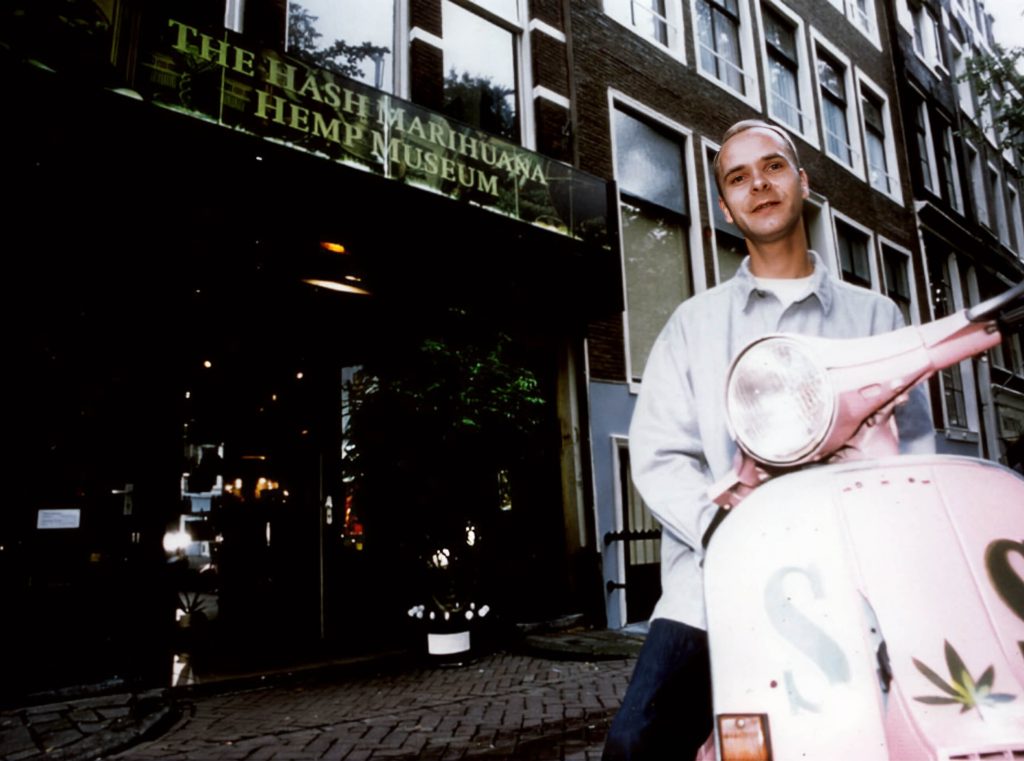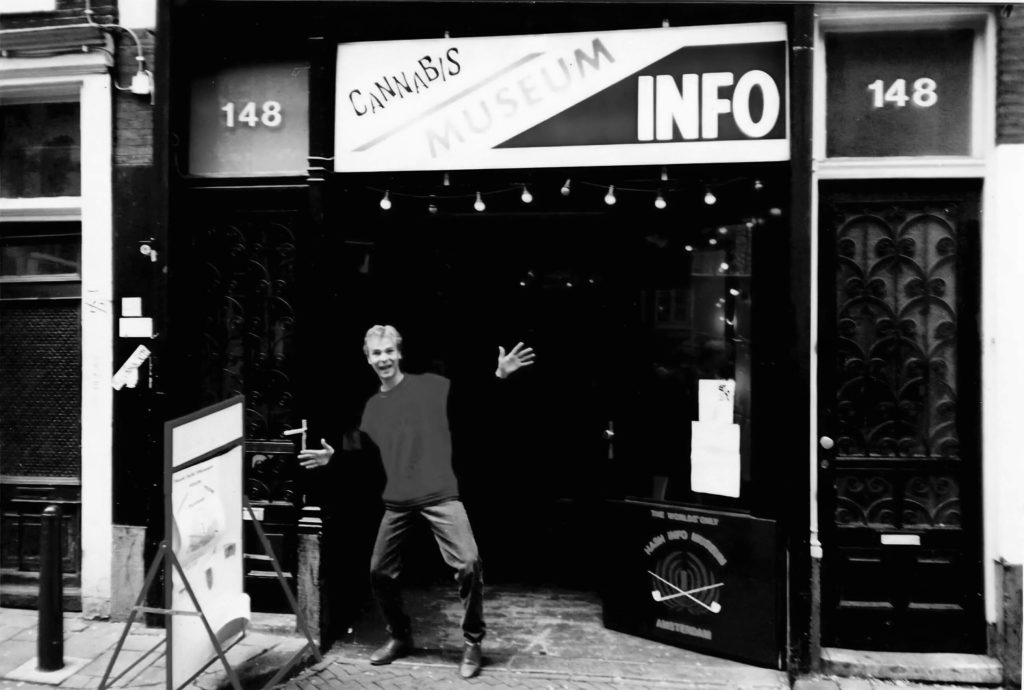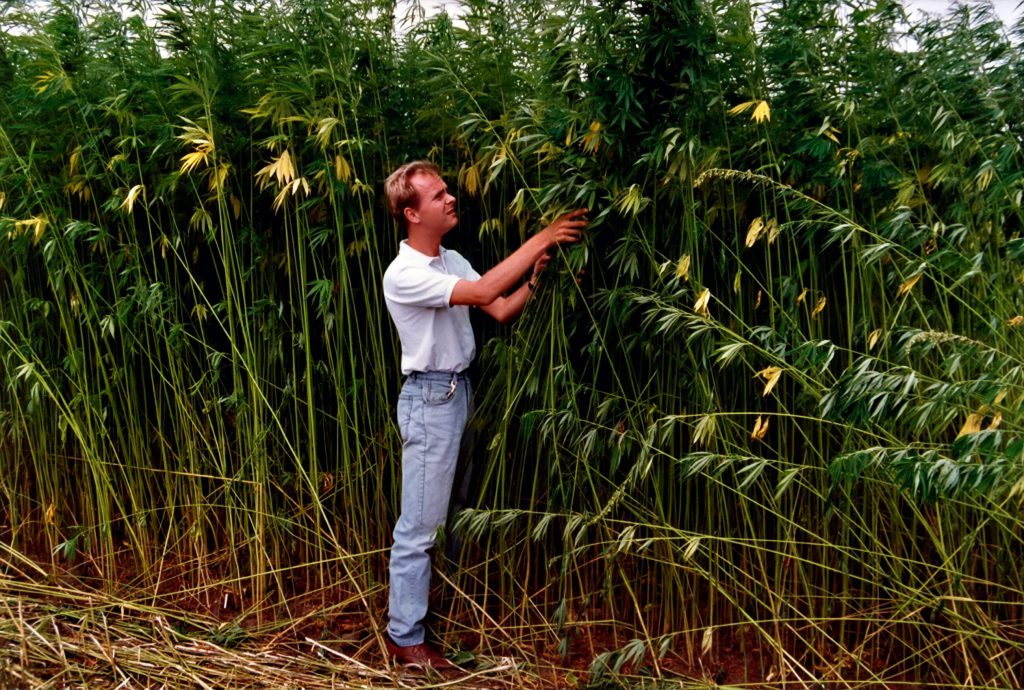Around a decade ago, Alan began his journey with cannabis in Laos, talking to officials about the plant and its many uses. Cannabis has been an essential medicinal herb in Buddhist traditional medicine, and one of his most unforgettable experiences was meeting with a two-star general at the Ministry of Defence.
How Alan Dronkers became a cannabis educator
We were honoured to speak with Alan about the developments within the cannabis industry and conducted this interview from Amsterdam. Alan was at his home in Southern Thailand, seeking refuge from the midday heat by sitting outside in the shade, smoking a joint.
Alan had regularly visited Thailand for almost 30 years when, in 1995, he met his partner on the Southern islands. They lived together for ten years at the Cannabis Castle in Nijmegen before moving to Thailand with their children in 2007. He has since become a leading authority in the Thai cannabis community.
Initially looking to raise awareness about the benefits of CBD for children with epilepsy, his journey began when he befriended a local Thai woman. Little did Alan know that she held a significant position in the government and would be highly influential in his path for cannabis reform.
He first travelled to the neighbouring country of Laos, where there were fewer levels of government than in Thailand. To get their attention, Alan started talking about the benefits of cannabis with a low THC profile for children with neurological disorders. To his surprise, the government welcomed his approach. He subsequently started advising the government on cannabis and hemp.


Around five years later, he approached the government of Thailand and became an official advisor for the Ministry of Agriculture. From there, Alan visited many government officials and universities. Passionate about cannabidiol, Alan educated some cannabis enthusiasts about its potential therapeutic properties, who later created the Highland magazine. Highland brought together doctors and parents for the first CBD trials in Thailand, helping to change public opinion towards cannabis.
On June 9th, 2022, Thailand became the first Southeastern Asian country to decriminalise cannabis, and the Thai Food and Drug Administration officially removed the plant from the list of class 5 narcotics. Although the change in cannabis legislation was enormous for Thailand, Alan says it had been coming for a while.
Cannabis regulations in Thailand compared to The Netherlands
Was it, as many believe, Alan’s idea for Thailand’s health minister, Anutin Charnvirakul, to give away a million cannabis plants? He is an agricultural advisor for the government, and it definitely sounds like a classic Dronkers idea! Alan assures us that it was not his plan. However, when he heard about it, it had his complete support.
He describes the decriminalisation of cannabis as courageous because of the international conventions of cannabis. The government listened to the people, and embraced the realisation that hemp and cannabis have been used as a traditional medicine in their culture for thousands of years. Now, in today’s Thai society, there is no problem with cannabis. The reformed illegal market is much more controllable, and more cannabis dispensaries are opening nationwide.
Unfortunately, not everyone has the same perspective on cannabis. To this day, many misjudgements exist. Alan is outraged about the current state of cannabis legislation in the Netherlands.
“How unbelievable that we are in a progressive democracy, and after 40 years of activism and the creation of the Sensi Seeds and the Hash, Marijuana & Hemp Museum, we still cannot legalise cannabis? It is not very reassuring. As coffeeshops are only tolerated in The Netherlands, there is no quality control, and most cannabis available is below-average quality, which we should be ashamed of.”
Due to increased arrests for cannabis cultivation, the authorities have created a situation where the quality of cannabis is terrible. Alan says, “I am one of the few Dutch people visiting some of these coffeeshops, and when I see what they are selling, I am embarrassed. It is not good! Only the fast-flowering, heavy indicas are available, rather than the lovely varieties that make you feel uplifted and energetic.”
In 2020, the Dutch government changed legislation to allow for the controlled cannabis supply chain experiment. This aims to lay the foundations for legalising large-scale cannabis production. During the experiment, coffeeshops within the chosen municipalities will be provided with regulated, quality-controlled cannabis from licensed growers.
However, the pilot scheme has been constantly postponed. At the time of writing, it is not expected to begin until 2024, and many people wonder how long the Netherlands will take to embrace cannabis as part of society.
Alan suggests that currently, there is a substantial problem with cannabis legalisation within Europe. Many countries have legalised or shown an interest in legalisation. However, in 2017, all EU countries transferred sovereignty to the EU Commission regarding drug policy. As a result, countries can no longer vote on such matters independently. While Alan is pleased that the topic is being discussed, he feels that too many regulations can limit individual freedom and hinder the industry’s growth.
Alan Dronkers’ role in Dutch cannabis breeding
The official Tolerance Policy (gedoogbeleid) began in 1972. This new legislation allowed the purchase and consumption of cannabis in establishments called coffeeshops, and Amsterdam soon became the cannabis hotspot of the world.
Unfortunately, outside these establishments, stringent regulations prohibit cannabis production, possession and distribution. Coffeeshops cannot purchase large amounts of legally-grown cannabis, and with no other option, they must buy their products on the unregulated black market. This is known as the backdoor policy.
Before 1982, there was no Dutch-grown cannabis, and the quality of flowers was often lower than average. The only available products were hash and fermented brown-coloured cannabis imported from South America and Africa. Alan states, “The so-called Dutch cannabis of that time was very low in quality and even grown from bird seed. Sensi Seeds was the green and good quality Cannabis revolution.“
Thriving to regenerate the cannabis community, Sensi Seeds wanted to make good-quality genetics available to everyone who wanted to grow. This, subsequently, helped raise the quality of cannabis in coffeeshops. Medicinal users became less dependent on coffeeshops and were able to cultivate genetics that flourished in the Netherlands.
During the early 1990s, Alan played an instrumental part in groundbreaking breeding programmes and helped pioneer influential varieties. He worked closely with sativas and indicas, making them accessible for growers in the northern hemisphere.
Alan endeavoured to increase their yield and resin content while preserving unique characteristics like dense bud structures and deliciously sweet terpene profiles. He remarks, “Pure sativa varieties are very long flowering and not ideal for colder temperatures. So, what we tried to do with these Thai varieties during the Fruity Juice breeding program was to develop a hybrid that would bring these sweet, uplifting cultivars to colder climates“.
These innovative genetics include Jack Herer, which was the first cannabis variety in the Netherlands prescribed by doctors and distributed through pharmacies, Jack Flash, Mr Nice, Black Domina, and Fruity Juice. Alan remarks, “It used to be Juicy Fruit, but Wrigley’s chewing gum company threatened us with a letter for a possible lawsuit, forcing us to change the name! – Nevertheless, it became a great seller!“
Alan has long since stepped away from breeding programs, but he advised the Thai Ministry of Agriculture to preserve all landrace genetics before they are lost to hybridisation. Alan believes these “heirloom genetics will soon be lost, or endorsed by large corporate companies.” It is crucial to preserve cannabis history, not just in Thailand but worldwide!
In the Netherlands, Sensi Seeds preserves all these original genetics at our research and development facilities, keeping them available for future breeding projects. Alan says that, “Through the eyes of the Dutch government, the function of Sensi Seeds is still wholly misunderstood, and they don’t understand the value of what we are doing. Rather than subsidise expenses, they do not appreciate the preservation of genetics.” However, that is not the case in Thailand, which is incredible due to its years of stringent cannabis legislation.
Preserving cannabis history – the Hash, Marihuana & Hemp Museum
The Hash Marihuana & Hemp Museum started in 1987 as a cannabis-based information centre with a small garden and a literature collection. Many old-school cannabis enthusiasts will remember the iconic black-and-white photo of Alan standing outside the entrance in 1991 with his arms open.


Decades later, it is more accessible and interactive than ever, attracting thousands of visitors annually. With an extraordinary collection of original artefacts and antiques, The Hash Marihuana & Hemp Museum tells the fascinating story of humankind’s relationship with the cannabis plant.
Alan finds it hard to choose a favourite piece in the collection and admires many objects. When asked if there is an artefact he wishes to have, he aims high. “Any item related to ritual cannabis use in the kingdom of Judah, which took place 2,700 years ago, would be a perfect addition“. Alan explains that he, and the Museum, have long speculated about cannabis in the Bible, even though it may be shocking for some people to believe!
In the 1960s, archaeologists found an ancient tomb dating back to around 700 BCE in the deserts of Negev, Israel. The tomb featured two altars which contained the psychoactive resin of frankincense and cannabis. The wife of the Hebrew god Ashera has been connected to cannabis, which provided undisputed evidence that cannabis was used for rituals in the Israelite Kingdom of Judah. The practice changed because of monotheism, and religious sites other than Jaweh were destroyed.
Alan says there are few places in the world where you can discover the history of cannabis through a unique range of cannabis-based literature, artefacts, and exhibitions. He is adamant about preserving cannabis history. He also thoroughly believes in Thailand’s revolutionary hemp industry, which the Queen of Thailand re-introduced.
Exploring Thailand’s hemp history
The Hmong are an indigenous group inhabiting the mountainous regions of northern Thailand, Laos and Vietnam. Alan says hemp is crucial in their culture, and its fibres have been used to create textiles and domestic products for centuries, keeping the ancient weaving tradition alive.
Throughout marriage ceremonies, the Hmong wear traditional dresses made of hemp. The umbilical cord is tied off with hemp fibre during birth, and after death, hemp is used for funerary rituals. The Hmong believe that before continuing their journey to the afterlife, people’s souls must return to their birthplace. In preparation, bodies are dressed in robust hemp clothing, which helps to protect them from anything dangerous during the trip!
With the influence of the United States in the 1960s, many Asian countries, including Thailand, introduced harsh penalties for hemp cultivation. Subsequently, the local police eradicated numerous crops. Many people were incriminated and incarcerated. However, the 21st century brought change.
In 2005, Queen Sirikit launched the first hemp research and re-classification programme and financed a decade-long hemp breeding program in the northern provinces. In 2018, hemp cultivation (with THC levels of <1% ) was legalised for industrial and medical purposes. “It is a beautiful story of culture and how hemp started in Thailand!” declares Alan. This created the foundations for cannabis reforms and highlighted Thailand’s rich hemp history.
In Thailand, before legalisation, only the government could help universities establish cannabis-based programs. Alan was among five professors who relocated to Chiang Mai Rajabhat University to help initiate its cannabis and hemp program. In recent years, more universities have been developing cannabis programs and are excited to learn about the benefits of this fantastic plant.
The Doctor of Cannabis


Alan received a technical agriculture and horticulture honorary doctorate from Rajabhat University in Chiang Mai in 2019. However, due to COVID, Alan received the Doctorate from the Chief of the Privy Council of the King, General Surayud Chulanont, in December 2022. He feels incredibly privileged to have been awarded this doctorate as a foreigner and says that standing in front of thousands was extraordinary and a real honour.
Alan pronounces, “It is a real contrast to the continuous stigmatisation from the Dutch government. Unfortunately, I am not receiving a doctorate from the King of the Netherlands. Giving out an honorary doctorate to people that do something with cannabis is almost unimaginable in our culture!”
Progression towards cannabis reform and education – Stay high, Thailand!
With increased educational programs and scientific research across Thailand, supported by the government, a more progressive approach to legalisation exists. Many countries are moving away from prohibition, and things are going in the right direction for cannabis legalisation. Alan assures us that he is in the right place and extremely happy.
“My life is my family, and especially in the last few years, I have been able to teach more, which is excellent. I feel more connected to Thailand because they have given me so much back for the little things I have achieved. I am honoured.”
A real pioneer in the cannabis industry, Alan Dronkers helped lay the foundations for many modern hybrids through his extensive breeding programs. He continues to pave the way for cannabis reform across Southeast Asia and to teach the world about cannabis and its many beneficial properties. We want to thank Alan for all his contributions to Sensi Seeds and the cannabis industry, along with celebrating his diploma in technical agriculture and horticulture.
- SEO Powered Content & PR Distribution. Get Amplified Today.
- PlatoData.Network Vertical Generative Ai. Empower Yourself. Access Here.
- PlatoAiStream. Web3 Intelligence. Knowledge Amplified. Access Here.
- PlatoESG. Carbon, CleanTech, Energy, Environment, Solar, Waste Management. Access Here.
- PlatoHealth. Biotech and Clinical Trials Intelligence. Access Here.
- Source: https://sensiseeds.com/en/blog/alan-dronkers-receives-honorary-doctorate-in-thailand/



